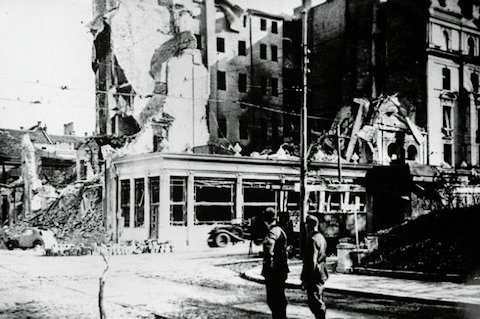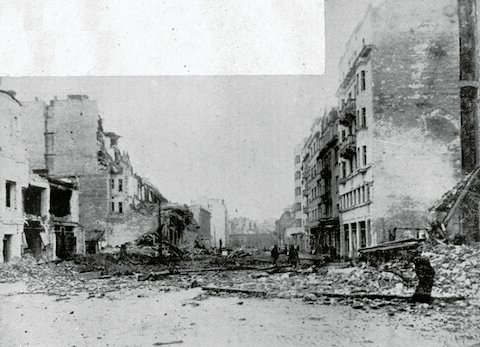
I’ve sometimes wondered if the air raids on Belgrade during the German invasion of Yugoslavia in April 1941 can be considered as a knock-out blow from the air. From the accounts I’ve read it seems that the Luftwaffe launched a surprise attack before the declaration of war, intended as a punishment for the pro-British coup. Sometimes it is said to have been indiscriminate bombing (Hitler ordered the destruction of the city), sometimes a more targeted attack (Luftflotte 4’s operational orders specified military and communication targets in the city centre). In any event there were heavy civilian casualties (the official number of dead is 2271, probably too low; 12,000 was the figure reported in the British press at the time — either way, the toll was higher than any night of the contemporaneous Blitz, albeit spread out over a few days) and the Yugoslav government was forced to flee — though with a Panzer army bearing down on Belgrade that was always going to happen anyway. In fact, despite their undoubted terror aspect, the Belgrade raids seem to me to be a true blitz: they were intended to disrupt a key command and logistics node ahead of a ground advance, just like Guernica in 1937 and Warsaw in 1939 (which latter had also been carried out by Luftflotte 4).
But it’s difficult to judge what happened on the ground given the scarcity of information (also because I haven’t really looked that hard). Recently, though, I found an eyewitness report from an unnamed Vichy journalist (for the ‘official French News Agency’, but relayed through Reuters) in the Scotsman, 11 April 1941, 4:
At 4 o’clock on Sunday morning [6 April 1941] the first German ‘planes flew over the capital. The population did not believe there was any immediate danger, and the ‘planes did not drop any bombs.
At 7.15 a new Alert was sounded. Most of the inhabitants remained in their homes when 150 Dorniers, accompanied by Stukas, dropped their first cargo of bombs on the city.
The toll was a heavy one. Terazije, the principal city square, was severely hit, and victims were numerous. The municipal buildings caught fire, and soon a pall of black smoke crept across the town.
Panic spread among the population, who did not expect so sudden an attack. When a second wave of ‘planes came over the town at 9 o’clock the exodus of the citizens began, and during this second attack the central electric supply and water stations were destroyed.
Numerous fires broke out, notably in the industrial quarter. Anti-aircraft and Yugoslav fighters immediately put up a vigorous resistance.
During a period of calm between 11 a.m. and 2 p.m. the departing population formed an uninterrupted stream on their way to the hills around the town.
The Government, after having sat at the Presidency of the Council under the bombs, decided to evacuate to the south, and Belgrade was declared an open town, as the troops rapidly withdrew from the capital.
(Here the Scotsman interjected to point out that Belgrade had actually been declared an open town on 3 April, though if there really were still Yugoslav troops there that would have given the Germans reason to consider it defended.)

A new attack was delivered, this time notably on the centre of the town, and not a single pane of glass was left intact. The streets were covered with splintered glass, goods of all kinds, as well as furniture. When one house in ten was blazing, the entire street was soon destroyed.
New attacks took place during the night of April 6-7, and on April 7, at 3 p.m., came the last. When it occurred only a few thousand inhabitants, hidden in shelters and cellars, were left.
When night came the flames leaped from house to house. None could put them out for the water supply had failed. Then in the deserted town pillaging began, but the authorities soon restored order.
Men not serving with the forces were mobilised to clear away the debris and inter the dead.
Some of the looters were shot when caught red-handed and their bodies left lying in the street.
Rain began to put out the fires.

Belgrade is a picture of desolation, with enormous shell craters in the middle of broad avenues, autobuses overturned, houses left frontless, and dead bodies strewn in the streets. Often these bodies were covered by flowers and wreathes taken from flower shops.
Men, women, and children began to search what was left of their homes for what they could rescue and carry away.
Demolition squads have been put to work to clear away the ruins. It is thought that several thousand bodies lie in suburban houses and air raid shelters.
Notices have been posted up warning looters and persons spreading alarmist rumours that they will be shot without trial. Shops which remain intact have reopened their doors. Queues immediately formed up outside.
The citizens of Belgrade are maintaining great discipline, and food prices are kept at their former level. Preparations are being made in the hospitals for vaccinations against cholera and typhoid.
The panic, exodus (only a few thousand people remained out of a total population of 370,000) and looters all conform to the ideal knock-out blow. Yet in the end the journalist says that civilians remain disciplined, food is being distributed, and the government is maintaining order. So in the end the knock-out blow failed; but the path for blitzkrieg was cleared.
Image sources: Wikipedia; Tanjug; Serbian Orthodox Church.
![]() This work is licensed under a Creative Commons Attribution-NonCommercial-NoDerivatives 4.0 International License.
Permissions beyond the scope of this license may be available at http://airminded.org/copyright/.
This work is licensed under a Creative Commons Attribution-NonCommercial-NoDerivatives 4.0 International License.
Permissions beyond the scope of this license may be available at http://airminded.org/copyright/.



